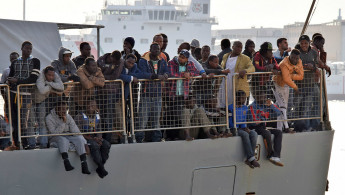EU considers admitting 20,000 migrants
The EU Commission, the executuive arm of the European Union pressed ahead Wednesday with a controversial proposal to introduce refugee quotas to ease pressure on countries with high migrant influx, despite strong opposition to the scheme.
The EU Commission sees the quota plan as key to forcing the EU countries to show solidarity with frontline partners like Italy, Greece and Malta.
Only five countries handled almost two-thirds of EU asylum applications last year.
Under special agreements, Britain, Ireland and Denmark would not be obliged to take part in the scheme.
Some countries, including Hungary, Slovakia and Estonia, have already rejected the quota plan, meaning the scheme is unlikely to pass. It would see maximum refugee levels set for each country based on population, GDP and employment levels.
British interior minister Theresa May said her country would take no part as it would only encourage more people to make the dangerous sea crossing and risk their lives.
"We cannot do anything which encourages more people to make these perilous journeys — or which makes it easier for the gangs responsible for their misery. That is why the UK will not participate in a mandatory system of resettlement or relocation," May wrote in The Times newspaper.
But Commission Vice President Frans Timmermans said that "what will make the situation worse is doing nothing," and he expressed hope that the British government would carefully study the migration agenda for tackling the problem the Commission unveiled Wednesday.
"If we do adopt these measures comprehensively," he told reporters, "I wonder how anyone can maintain that this would make the situation worse."
Italy's interior minister, Angelino Alfano, welcomed the quota scheme.
"The Dublin 'wall' could fall if we reach approval of obligatory quotas for migrants that each country must take in," he said on state-run RAI radio, referring to the EU's so-called Dublin system of laws that notably dictate that asylum-seekers must be processed in the country where they first land.
Officials from Malta also support the plan, which would evolve from a "temporary distribution mechanism" that the EU will propose within two weeks as an emergency step to share out refugees wherever there is a mass influx.
Germany has taken the most refugees in Europe from Syria, and Berlin expressed regret that some EU nations are opposed to the quota scheme.
Meanwhile, Turkey's President Recep Tayyip Erdogan has called on Europe to take in more migrants and refugees from Syria and Iraq, saying his own country has borne the brunt of the refugee crisis and has been sheltering some 2 million people.
A Mediterranean mass grave
More than 170,000 illegal border crossings were recorded through the Mediterranean last year, mostly Syrians and Eritreans leaving via Libya, whose collapse has allowed criminal gangs and terrorists to flourish.
Around 1,700 migrants are feared to have died in recent weeks even before the high season for sea migration begins in June.
More than 5,000 migrants, many escaping civil war in Syria, have died over the past 18 months.
Until now, EU states have admitted refugees on a voluntary basis under the principle that their asylum requests are processed in the country where they land, not the country they are trying to get to.
The EU statistics agency Eurostat said Tuesday that EU member states granted protection to more than 185,000 asylum seekers last year, an increase of nearly 50 percent over 2013. The figure includes those given refugee status.
The draft of the blueprint on Wednesday left blank the refugee quota numbers, a sign that the college of 28 commissioners had still to decide on them.
Nor did the proposals suggest they would be mandatory, at least until after 2016.
The military angle has also run into difficulties, with EU’s High Representative, Federica Mogherini, winning little support during an appeal to the UN Security Council on Monday for its backing for the use of European military force against smugglers in Libyan territorial waters.
The plan targets not only the traffickers but also triples funding for EU search and rescue missions and calls for admitting more migrants.
The final plan is supposed to be put before EU leaders at their June 25-26 summit but immigration is such a sensitive political issue for many member states that agreement could prove elusive, especially when it comes to sharing the burden.
The UN High Commissioner for Refugees has urged the EU to admit annually a total of 20,000 Syrians who have taken refuge in neighbouring countries.
But one European source said no figure has so far been offered to the Commissioners.





 Follow the Middle East's top stories in English at The New Arab on Google News
Follow the Middle East's top stories in English at The New Arab on Google News
![Both Hamas and the Palestinian Authority welcomed the ICC arrest warrants [Getty]](/sites/default/files/styles/image_330x185/public/2024-11/GettyImages-2178351173.jpg?h=199d8c1f&itok=TV858iVg)

